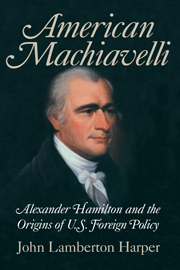Book contents
- Frontmatter
- Contents
- List of Illustrations
- Acknowledgments
- Miscellaneous Frontmatter
- Introduction
- PART I THE COMING OF NECESSITY
- PART II BATTLE LINES ARE DRAWN
- 3 At Washington’s Side Again, 1789
- 4 Hamilton versus the Virginians, 1789–1791
- 5 The Nootka Sound Crisis, Part One: The Morris Mission
- 6 Nootka Sound, Part Two: The View from New York
- 7 Liaisons Dangereuses, 1791–1792
- PART III SEIZING THE HELM
- PART IV INFORMAL ADVISER TO THE PRINCE
- PART V A PRINCE IN HIS OWN RIGHT?
- PART VI THE LESSER OF EVILS
- Conclusion: Hamilton Then and Now
- Notes
- Bibliography
- Index
4 - Hamilton versus the Virginians, 1789–1791
Published online by Cambridge University Press: 05 April 2013
- Frontmatter
- Contents
- List of Illustrations
- Acknowledgments
- Miscellaneous Frontmatter
- Introduction
- PART I THE COMING OF NECESSITY
- PART II BATTLE LINES ARE DRAWN
- 3 At Washington’s Side Again, 1789
- 4 Hamilton versus the Virginians, 1789–1791
- 5 The Nootka Sound Crisis, Part One: The Morris Mission
- 6 Nootka Sound, Part Two: The View from New York
- 7 Liaisons Dangereuses, 1791–1792
- PART III SEIZING THE HELM
- PART IV INFORMAL ADVISER TO THE PRINCE
- PART V A PRINCE IN HIS OWN RIGHT?
- PART VI THE LESSER OF EVILS
- Conclusion: Hamilton Then and Now
- Notes
- Bibliography
- Index
Summary
Introduction
Major George Beckwith was a well-connected and seasoned observer of American politics. He had been an intelligence officer under Lord Dorchester (then Sir Guy Carleton) in New York toward the end of the war and had visited the city in 1787 and 1788. During their October 1789 meeting, he nonetheless admitted his puzzlement to Hamilton on one point. He had been “much surprized [sic] to find among those Gentlemen so decidedly hostile” to Britain, “a person, from whose Character for good sense, and other qualifications, [he] should have been led to Expect a very different conduct.” Hamilton immediately understood and admitted that he too had been “rather surprized.” Said Hamilton, “The truth is, that although this gentleman is a clever man, he is very little Acquainted with the world. That he is Uncorrupted And incorruptible I have not a doubt; he has the same End in view that I have, And so have those gentlemen, who Act with him, but their mode of attaining it is very different.” A year later Hamilton offered a different analysis: “You know we have two parties with us; there are gentlemen, who think we ought to be connected with France in the most intimate terms . . . there are others who are at least as numerous, and influential, who decidedly prefer an English connexion.” By 1790–91, Hamilton was no longer in a position to say that he and the gentleman had “the same End in view.”
- Type
- Chapter
- Information
- American MachiavelliAlexander Hamilton and the Origins of U.S. Foreign Policy, pp. 55 - 64Publisher: Cambridge University PressPrint publication year: 2004



